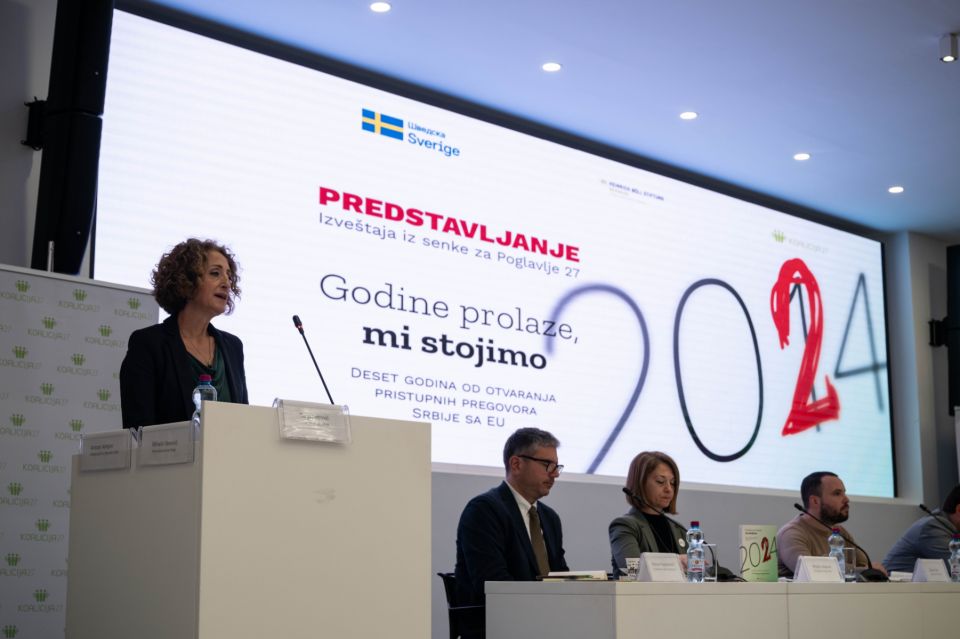Are we closer to the EU today or further away, and how much progress has Serbia made from 2014 to today? Coalition 27 presented its new Shadow Report, which, among other things, analyzes financial investments in environmental protection from the opening of Serbia’s EU accession negotiations in 2014 to 2023.
This year’s report is titled “Years go by, we stand still,” as it reflects the Coalition 27’s assessment of progress in Chapter 27: Environment and Climate Change over the past decade. A new feature of this year’s Shadow Report is that, in addition to addressing key events in the fields of environmental protection and climate change, it also answers the question: How much has Serbia invested in environmental protection since opening negotiations?
The analysis shows that over the past decade, the state has invested only about 30% of the funds it planned to invest in environmental protection, according to the National Strategy for Approximation of Serbia (NEAS), and only 20% in infrastructure investments. This is far below the level of investment needed to achieve significant progress in environmental protection. If investing in the environment is a luxury Serbia can’t afford, can we afford the luxury of hospital treatments, environmental destruction, and slow progress?
Coalition 27 also points out that this document was adopted in 2011, and that it represents a rather conservative estimate of financial investments, with newer strategies and plans showing that the actual sum is far higher. For example, in the area of water management, less than 10% of the projected amount for improving water quality has been invested. In other areas of environmental protection, such as waste management, there are real costs and investments, but insufficient capital expenditures, which is why Serbia, despite significant costs, is still far from establishing an efficient waste management system based on the principles of a circular economy. Also, it is worth noting that the amount collected through environmental fees, according to the draft of the Environmental Protection Strategy (September 2024), amounts to 3.9% of GDP, while Serbia has been investing around 1% of GDP in environmental protection annually since 2021.
Coalition 27 also reminds that the Government of the Republic of Serbia has not yet established an operational Green Fund to finance environmental protection reforms, despite this chapter being one of the most financially demanding. This is also one of the key recommendations of the European Commission, which is repeatedly emphasized in its reports for Serbia. The Environmental Protection Fund was established in 2009 as an institution responsible for managing funds collected through ecological taxes and fees, directing them into projects aimed at improving the environment. This institutionalized the “polluter pays” principle, as companies directly paid fees into the Fund's budget, from where the money was allocated to projects through tenders. Since 2012, the Environmental Protection Fund ceased to function, with ecological taxes becoming part of the national budget. By 2021, the Green Fund no longer exists as an independent institution or a budgetary fund. This has significantly reduced transparency and made it difficult to monitor how the government spends funds collected through these fees.
For the public to truly influence decision-making processes regarding the environment, in addition to addressing issues such as institutional closure, non-transparent processes, and the drafting and amending of laws, it is crucial to support and maintain an open relationship with civil society in Serbia. In this context, Coalition 27 does not share the optimism expressed in the 2024 European Commission Report for Serbia and believes that while Serbia has made progress in many areas, this progress is often unrealistic and unjustified. The country should significantly strengthen its administrative capacities in the environmental protection sector at all levels of government, including inspections and the judiciary.
Furthermore, Coalition 27 once again calls for the adoption of the recommendations outlined in the new Shadow Report, which address air and water quality, forest management, chemicals, waste, nature protection, noise, industrial pollution, and horizontal legislation in this area. These recommendations provide a clear overview of the current state of affairs, the strategic and legislative framework, and the implementation of regulations in practice.
In response to the question of whether Serbia is closer to the EU or further away, it can be said that, without a strategic approach, clear ambitions, and investments in them, modest progress is sometimes just standing still, especially when considering that even one-third of the total EU legislation that candidate countries must implement concerns Chapter 27. In addition to the obvious lack of political will and the (non)inclusion of expert public input, the primary reason for such disappointing results is that financial investments in the environment during this period, despite ambitious plans, have remained at a consistently low level.
The Shadow Report “Years Go By, We Stand Still” covers the period from April 2023 to April 2024 and contains detailed recommendations for each area of Chapter 27. You can download the report HERE.
Coalition 27 organized a presentation of the Shadow Report at an event attended by civil society representatives, the EU Delegation, experts, and media at the Serbian Chamber of Commerce. The event was opened by representatives of Coalition 27 and Antoan Avignon from the EU Delegation to Serbia, who highlighted the significance and quality of the report. Mihailo Vesović from the Serbian Chamber of Commerce also addressed the audience, and economic experts and professors contributed to the discussion.
A photo gallery from the event is available here.
Photographer: Zorica Popović

 381 60 30 65 800
381 60 30 65 800






